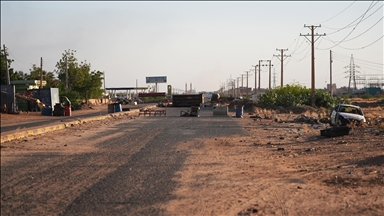UN cites 'horrifying' escalation in Sudan as El-Fasher falls to Rapid Support Forces
'The situation is chaotic. In this context, it is difficult to estimate the number of civilians killed,' says official
 Photo by Mohammed Elshamy
Photo by Mohammed Elshamy
WASHINGTON
A senior UN official warned on Thursday that Sudan’s civil war has entered a new phase after the Rapid Support Forces (RSF) seized control of El-Fasher in North Darfur, prompting fears of mass atrocities and further regional instability.
In a briefing to the Security Council, Martha Ama Akyaa Pobee, assistant secretary-general for Africa in the Departments of Political and Peacebuilding Affairs and Peace Operations, said the situation in Sudan has "deteriorated even further," with widespread suffering, new waves of violence, and escalating risks to civilians.
"After more than 500 days under siege, the city of El-Fasher in North Darfur has been captured by the Rapid Support Forces. Only small pockets of resistance remain. The fall of the city marks a significant shift in the security dynamics. The implications for the people of Sudan and the region are significant," Pobee added.
Pobee said shifting military dynamics continue to shape the course of the conflict.
"The human cost is profound. The risk of mass atrocities, ethnically targeted violence and further violations of international humanitarian law, including sexual violence, remains alarmingly high across the country, and particularly in El-Fasher," she added.
"The situation is simply horrifying," Pobee said, adding that in the past week, the UN Human Rights Office has received credible reports of mass killings, summary executions and house-to-house searches as civilians attempted to flee.
"The situation is chaotic. In this context, it is difficult to estimate the number of civilians killed. Despite commitments to protect civilians, the reality is that no one is safe in El-Fasher," she said.
The UN official said violence has intensified in the Kordofan region, where the RSF recently captured the city of Bara. She cited reports of reprisals and ethnically targeted killings, including the execution of five Red Crescent volunteers.
She reiterated UN Secretary-General Antonio Guterres's call for an immediate ceasefire and renewed peace talks. She also condemned foreign interference and the flow of weapons and fighters into Sudan.
- 'We must intensify our call for an urgent and lasting solution'
Pobee said UN personal envoy Lakhdar Lamamra has invited both parties to engage in technical talks focused on de-escalation and civilian protection. Both sides have reportedly shown an initial willingness to participate.
Regional diplomacy is intensifying as well. The African Union (AU), the Intergovernmental Authority on Development, the League of Arab States and the UN -- operating through the so-called Quartet mechanism -- are preparing an inter-Sudanese dialogue under AU auspices. Parallel coordination with the Quad initiative -- involving Egypt, Saudi Arabia, the United Arab Emirates, and the US -- is also underway.
The upcoming AU–UN Ministerial Consultative Group meeting in Addis Ababa will provide an opportunity for mediators to align efforts and strengthen coordination, she said.
Pobee concluded with a sharp appeal for decisive international action, warning that the Council’s failure to respond meaningfully risks enabling further atrocities.
"As the conflict reaches yet another critical point, we must intensify our call for an urgent and lasting solution. Reports and warnings about the unfolding catastrophe in El-Fasher have been issued for months.
"Thus far, the United Nations Security Council has not taken decisive action to prevent the situation from deteriorating. We must all play our part in helping to bring this devastating war to an end. We must stand with the people of Sudan who have suffered far too much for far too long," she said.
Pobee called on the Council to use "all the tools at its disposal" to demand peace in the Sudan. "We count on the Council to lead the way," she added.
The conflict between the army and the RSF, which began in mid-April 2023, has claimed more than 20,000 lives and displaced 14 million people, according to the UN and local authorities.








